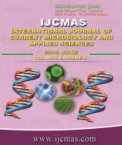


 National Academy of Agricultural Sciences (NAAS)
National Academy of Agricultural Sciences (NAAS)

|
PRINT ISSN : 2319-7692
Online ISSN : 2319-7706 Issues : 12 per year Publisher : Excellent Publishers Email : editorijcmas@gmail.com / submit@ijcmas.com Editor-in-chief: Dr.M.Prakash Index Copernicus ICV 2018: 95.39 NAAS RATING 2020: 5.38 |
Seed health testing to detect seed-borne pathogens is an important step in the management of crop diseases. Laboratory experiments were carried out at College of Agriculture, Bhawanipatna during Kharif, 2018 to investigate the planting value of the seed and extent of seed-borne fungal pathogen problems from farmers saved seeds in Western undulated Zone of Odisha. A total number of six seed samples of Sesame were collected from farmers saved seeds in M. Rampur, Karlapada, Bhawanipatna, T. Rampur, Kesinga and Narla block of Kalahandi districts. Each sample was physically inspected and pure seeds were separated from abnormal seeds and inert matter. Seed samples collected at T. Rampur and Kesinga were of high quality compared to seed samples collected at Karlapada, M.Rampur, Bhawanipatna and Narla. Seed moisture content and pure seeds ranged from 9.3- 11.2% and 82-93% respectively. In seed health study, six fungi namely Fusarium spp., Macrophomina phaseolina, Curvularia sp. Aspergillus flavus, Penicillium sp., and Alternaria sp. were found in the seed samples of farmers saved seeds. Among the fungi, prevalence of Fusarium, Macrophomina, Curvularia, Alternaria were maximal ranging from 23.9% - 35.4% which was followed by Aspergillus flavus, Penicillium spp. (18.5% to 19%). The percentage of fungal seed infection was higher in seed samples collected at Bhawanipatna and Narla with infection rate of 33.1 % &34.2% respectively and lowest for seeds sample collected at T. Rampur and Kesinga with infection rate of 15.5 & 17.3% respectively. All the six fungal pathogens were more prevalent in farmer saved seed and it is recommended that seed should be well dried to keep seed moisture content within the 9.0% and treated with appropriate fungicides prior to planting inorder to have better seed quality.
 |
 |
 |
 |
 |